Everyone Out
Need I tell you to step outdoors? I think not! You know as well as anyone that it is in the mid-70’s right now, a temperature we are not likely to enjoy again this month. It is perhaps not the brightest of days, but who cares? MID-70’s. You need to go get yourselves some of that. But maybe you are at your place of work, and your employer has the strange notion that you need to remain at your desk? Inform your employer that it is vital for your mental health and physical well-being that you experience some of the rare goodness the weather is sending our way. Should he or she find this line of reasoning unpersuasive, tell him or her to suck it. (By “it” I mean “your penis.” Don’t have a penis? Take any reasonably-sized tube-shaped object and wave it near your crotch. If you’re feeling particularly creative you could perhaps stroke it in an up-and-down fashion to better emphasize your point.) He or she will surely be convinced. Even if that does not work, there is still a good chance you will find yourself outdoors fairly quickly anyway. It’s win-win!
How a Biller Becomes A Lobbyist
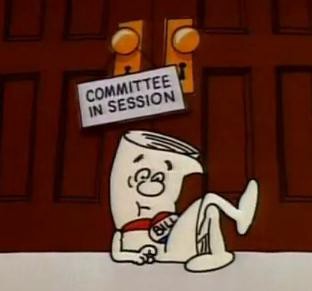
“Consider, for example, the curious case of Liz Fowler. Fowler went from being the chief counsel for the Senate Finance Committee to being the vice president for public policy and external affairs at health insurer WellPoint in 2006. But two years later, Fowler returned to the Hill as an aide to Democratic Sen. Max Baucus (Mont.), where she — guess what? — made sure that WellPoint’s interests were favored during the health care reform debate.
“Naturally, she then moved on to a position in the White House, where her job description became ‘to ‘oversee’ the implementation of the law.’
“I’m sure that Fowler took a substantial pay cut to do both of those jobs, as well, but I’m not worried about her livelihood, because if there’s one thing that Max Baucus is very, very good at, it’s getting his former staffers high-paying jobs in the health care lobbying industry.”
The Earlier You Drink, The Earlier You Figure Out Why Drinking Is Awesome
Science, you say this like it’s a bad thing: “The earlier people first begin drinking, the greater their chances of using alcohol as a coping technique to deal with stress later in life, a new study finds.”
A New Gilded Age? Yay!
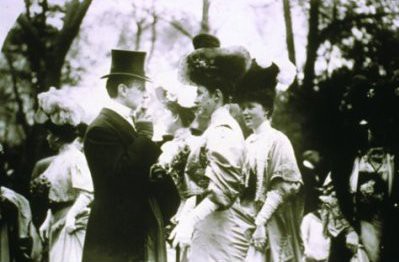
Is it inappropriate to invoke the phrase “CLASS WAR” these days? It’s scary, that’s for sure — what kind of war is actually fun, other than maybe a thumb war (if you have agile and forceful thumbs)? Why fuss and fight when you could be teaching a child to read, or livetweeting? And issues of class, they seem very out-of-date, very subject of the college class to which you didn’t pay attention, very “Allentown,” and not the city but the song by Billy Joel. A class war is not how you want to spend your day off, or even your community service. Sadly, it’s not unfair to bring it up. Whether you are a Milwaukee middle-school teacher or a middle linebacker for the Bills, there are issues between labor and employer. You don’t necessarily have to pick a side, but you do have to relegate yourself to hearing about it for the foreseeable future. Remember when politics was lite and bubbly and mostly revolved around flag pins and the wattage of one’s smile? Those times are gone, just like that “Pants On The Ground” song. The class war is here to stay, and who knows how it’s going to end?
Let’s just assume, because we’re pessimists who have been fed a steady buffet of disappointment for our entire lives, that it’s going to end poorly. Let’s hope for the best (and by all means keep watching The Daily Show With Jon Stewart or whatever else rouses you for a short flicker), but let’s prepare for the worst. Let’s look on the bright side.
The Gilded Age wasn’t really all that bad, when you think about it!
The Gilded Age, as we know, was that period of American history prior to the turn of the last century that witnessed incredible economic expansion coupled with an oppressed working class employed under repressive and horrific conditions. It’s funny to think of, that an era could be known simultaneously for unimaginable prosperity and for a huge caste of Americans whose ninety-hour work weeks did not pull them from poverty, because it kind of implies that there was a period between then and now when that was not so. The reason why this happened back then was this legal concept of “freedom of contract,” which means that the employer can do whatever they want to do always and the employee is equally free to do whatever they want, as long as what they want to do is quit. But it’s a snazzy turn of phrase, and that’s the first thing that will be decent about our looming New Gilded Age: the nomenclature is catchy.
Take also the term itself: “Gilded Age” was coined in part by Mark Twain, so that’s an enormous plus, as Mark Twain is Mark Twain. It’s also an early example of snark (which was called “irony” back then), a play on the term “Golden Age.” At the time people would mash a thin layer of gold onto something to make it look like it was made of gold through and through, instead of just making it out of plastic like we do now. This was known as “gilding” and thus Twain’s snark is the good kind that is gonna hurt in the morning, if you know what I mean! So if we have to have another Gilded Age, at least we can quietly snicker to ourselves as we say it, which will surely be a comfort to us while we are standing in the bread line or edging the sidewalk of a hedge fund manager’s mistress’ second home.
This is not necessarily to say that we will all be bread-line-standers, or mistress-sidewalk-edgers. In this New Gilded Age, some of us might get to be mistresses! Sadly, others of us might get to be the sidewalks. Employment opportunity might not be as bad as it is now, but that’s not really saying a lot. But if it does come, this ascendency of the already ascendant, mistress/sidewalk is going to look like a great entry-level position with decent bennies and room for advancement.
And it won’t all be work. Some of the unintended consequences of a New Gilded Age might be not as bad as the direct outcomes (company towns, debtors prisons, the grippe) we cringe from. For example, we’d save whatever we were paying on union dues, which we could spend on exciting and increasingly complex gadgets that don’t really do much but become obsolete in six months — or on gruel. As all the workforces slowly merge into one giant workforce, working for the same global titan of business, we’ll be freed up from having to worry about things like career and ambition. In fact, with the sixteen-hour workday, we’d also be freed up from free time, and the crushing anxiety that comes with it. Presumably, we’d also be issued uniforms, hopefully something flattering. Uniforms would be cool in any context, as long as they have collars to pop. And this could very well be a boom time for religion, masses are going to need some serious opiates with all that crushing tedium. Maybe even the megabarons will take pity on us and found a new church, something casual but flashy, hopefully with gambling.

Here’s an even bigger side effect. One of the industries that fueled the original Gilded Age was the railroad industry, as rail barons gridded the nation with the means to move large quantities of stuff great distances all at once. This is a sector that would be fantastic to see recreated in this 21st Century: infrastructure. No matter how gainfully we are employed (or underemployed), we still have parents living in Virginia to visit or a Jeff Mangum show to drive to, not to mention a need for water with which to make our Country Time lemonade. And if our new overlords have any sense of nostalgic integrity, then they will take a break from their planet-sized concerns that make money by moving money from one place to another place and earn another couple billion by improving our bridges and natural gas fuel lines. Then maybe we’ll all get to where we’re going without plunging into a ravine and turn on the oven without the city block exploding. The upside: not being dead, which is a valuable one in any time period.
If you think about it, the entire aesthetic of steampunk is derived from the technology and style of the Old Gilded Age, with the goggles and the levers and the steam and the punk. So if we have to have a New Gilded Age, that means we will not only have to Google “Beaux Arts” but also we’ll get to have a New Steampunk! Every day will be like Boing Boing!
Ultimately, maybe the best possible outcome of an extended Gilded Age is this: evolution. It’s controversial, somehow, especially if you’re afraid of science, but the concept of natural selection is still the most popular explanation for the change in species over time (and theorized by Darwin during the Old Gilded Age, coincidentally). Maybe, just maybe, the conditions created by the New Gilded Age, the serfdom, the futility, the washed-out sepias and greys, are the conditions necessary for us to evolve into our ideal selves: losing both pinky toes, but gaining secret mind powers. A pinky toe is a lot to lose (let alone two!), but with our new secret mind powers we can maybe rejoin that class war we lost all those years ago and finally have a chance of winning. Or at least, have a chance of winning without having to try too hard, because trying hard is a drag. Secret mind powers would make the whole enterprise an awful lot easier, and we’d still have time left over to watch “Castle.”
Of course, a New Gilded Age is not written in stone; it is only very very likely. It may happen — or the plutocrats may have a sudden and uncharacteristic attack of conscience. And if it is coming, who knows if it happens tomorrow, or just the day after tomorrow. In the meantime, we should bend our backs to the task of welcoming the new era, with dignity and resignation. Remember that Nikola Tesla found his footing in the Old Gilded Age and then spent the rest of his life getting screwed by Edison. If Tesla could suck it up, so can we, and if we can’t make awesome out of a Gilded Age, then maybe we don’t deserve to have a class war in the first place.
God's Wife Almost Got Screwed Out Of The Bible

Did you know that God had a wife? You probably did not! Why would you have, when men have tried to keep the truth from you for so long? Mrs. God, also known as Asherah, was worshiped alongside her husband as a symbol of fertility, until a bunch of guys who wanted a single-serving dude-focused deity attempted to write her character out of the Bible. And if it weren’t for a bunch of researchers and theologians, they would have gotten away with it.
J. Edward Wright, president of both The Arizona Center for Judaic Studies and The Albright Institute for Archaeological Research, told Discovery News that he agrees several Hebrew inscriptions mention “Yahweh and his Asherah.”
“Asherah was not entirely edited out of the Bible by its male editors,” he added. “Traces of her remain, and based on those traces, archaeological evidence and references to her in texts from nations bordering Israel and Judah, we can reconstruct her role in the religions of the Southern Levant.”
Scholars have found mentions of Asherah in ancient scrolls, on pottery, and even the Book of Kings, which refers to a popular entertainment of the era called “The Real Housewife of Heaven.”
The End of Lou Reed: HP's "Everybody On" Ad
by Mat Honan
HP’s new “Everybody On” campaign is just about the least cool thing I’ve ever seen. And I was an Eagle Scout! And I’m a birder! And I was on the debate team! And I went to debate camp!
Did you miss those lyrics? Here’s a transcription!
Everybody Touch
Everybody Tap
Everybody Move
Everybody App
Everybody Digg
Everybody Host
Everybody Skype
Everybody Post
Everybody Dream
Everybody Sprint
Everybody Air
Everybody Print
Everybody Brag
Everybody Tweet
Everybody Shuffle
Everybody Beats
Everybody Global
Everybody Mobile
Everybody Cloud
Everybody Now
Everybody Nimble
Everybody Bond
Everybody Instant
Everybody… On
HP touts it as “a re-recorded a version of Lou Reed’s iconic ‘Walk On the Wild Side,’ which he created specifically for HP.” Wow. That’s lame, Lou. Go meet Iggy on the lido deck.
Mat Honan is a contributing editor to WIRED, and co-founder of Longshot magazine.
Lines On A Transit Altercation Precipitated By General Inconsiderateness
Lines On A Transit Altercation Precipitated By General Inconsiderateness
I’m pained to say that I’m resigned
To knowing people can’t be kind
With all the anger and mistrust
I’m not surprised that folks combust
It’s true that life is hard and sad
And full of reasons to get mad
But what if we all showed more grace
and stayed out of each other’s space?
I’d love if we could all just please
Observe some basic niceties
Like maybe we could all refrain
From eating food while on the train
And let’s not, at the very least,
Compare a human to a beast
The little things, that’s all I ask
I guess that it’s a futile task
I sigh and know that people surely
will still treat each other poorly
The only way we can connect
Appears to be through disrespect
It’s difficult to not be tense
When every snub seems so immense
But so long as there are these slights
I’m kind of glad they tape the fights
The End of 'Big Love,' the Rise of 'Sister Wives': Mormons, Gays and Reality TV
by Melissa Tapper Goldman
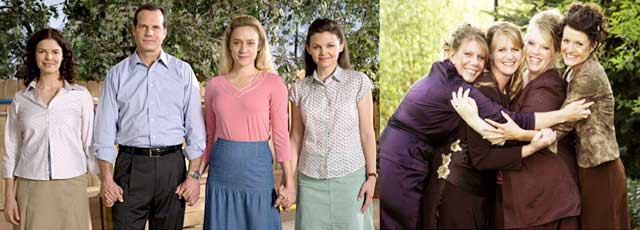
America loves TV about polygamy. After four years of the scintillating fiction of “Big Love,” we were ready for fact. Or, at least, the reality-TV version of it. TLC’s series “Sister Wives” finally arrived in 2010, and the second season has just begun, as “Big Love” concludes this weekend. Like an elephant with a friendly bird to eat flies off of its back, the two shows have formed a sort of symbiosis.
Fact and fiction intertwine: “Sister Wives” shows you the real-life versions of the characters. “Big Love” shows you what they might look like in bed. The excitement of “Big Love” relied on our faith in the characters’ realism, both in its writing and premise. Now, unlike the characters of both shows, we don’t need faith anymore. Instead, we find ourselves sunk in the uncanny valley between the real brood and the fake one. The two families even look shockingly alike. Kody Brown’s first wife, Meri, is a mirror of Jeanne Tripplehorne’s reserved face and emotive, scrunched mouth. His newest and youngest wife, Robin, shares Ginnifer Goodwin’s bone structure and girlish figure. It’s as though the Browns were made for TV — the attractive family next door that just happens to include four wives and 16 blond children.
Beyond the bedroom, the boldness possible in the fictional world of “Big Love” allows the show to tackle some political issues that “Sister Wives” will barely allude to. If gay marriage didn’t think it needed any more input from Mormons, the Browns are about to unload some heavy stuff on us, and it’s not in the form you might expect.
Sex In The Salt Flats
Religious polygamy makes for undeniable human drama. It’s a classic sexy story, full of taboo, betrayal and jealousy. It includes the love between men and women — and the love that women can only share with one another.
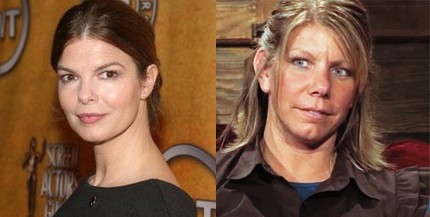
While Kody relies on a veneer of boyish charm, the wives are no nonsense. The Alpha Dog, the Career Woman and the Prim and Proper, they are strong voices in favor of polygamy, who nevertheless don’t sugarcoat the challenges. No robo-child-brides here. The addition of a fourth wife, Robyn, was disruptive to the entire family, a fact acknowledged by everyone except for Kody (who by now knows better than to open his mouth). The three wives coped with patience, humor and an enviable level of magnanimity — even if they needed to walk off camera to cry sometimes. Third wife Christine quipped, “I’m glad he’s getting a trophy wife. He’s a great guy. He deserves a cute girl.”
Of course we all want to hear about their sex lives. On this topic, they are uncharacteristically mum. When asked who has sex with whom, first wife Meri inelegantly deflects any suggestions of girl-on-girl action, “We don’t go weird.” Most disappointing is Kody’s willful ignorance about his wives’ experiences. Meri struggles to cope with jealousy. She and Kody discuss the issue over a romantic dinner for their 20th wedding anniversary. Meri is not proud of her emotions but wants to feel understood. She asks Kody to consider how he’d feel if she were with someone else. “Obviously, that’s just not something I am even comfortable imagining,” he said. “The vulgarity of you with another man or lover sickens me.” His response is jarring; their dynamic is apparently made possible only by Meri’s capacity to accommodate.
The Browns are caught between two worlds: the rules-loving realm of fundamental Mormonism, and the nonconformist domain of marital deviants. Teenage daughter Mariah struggles in her transition from a polygamist school into the local public school. She doesn’t want to hang out with freaks, but she’s a freak. A classic teenage predicament. Unfortunately, her parents don’t help her to make sense of the situation, and the tension runs beneath the surface. Will they encourage her to be accepting of others, as they in turn ask for the acceptance of the viewing public? Or are they themselves uncomfortable with their daughter hanging around with sailor-mouthed pot-smokers and other school outcasts?
Principles On Primetime
Many arguments against gay marriage have utilized the “logical conclusion” line of reasoning: if we accept marriage for the gays, next will come marriage to animals, family members, multiple partners. While gay marriage might appear tolerable, the other examples are meant to scare you. So it goes that all “alternative” family structures become melded into one tangled web of things that people are uncomfortable imagining in the privacy of their minds. It is somehow unsurprising that in Utah, the heart of the battlefield for the American family, attitudes about gay marriage and plural marriage have turned into an impossible morass of issues dating back long before the gay civil rights struggle, to the wildest west of all, the 19th-century Mormon frontier.
Thankfully, the TLC network has perfected the business of pat, voyeuristic reality television to help us begin the conversation. For the last decade, TLC has made its bread and butter from reality shows about families that seem different, but upon further inspection are just like you and me. The TLC lineup is stacked with “little people,” fundamentalist Christians who flout birth control, sextuplets and women who didn’t realize they were pregnant until they gave birth. Part freak show, part humanizing documentary, these series address two related components of our human nature: gossip and a drive toward compassion. It’d odd to remember that TLC was once known as The Learning Channel. The network is now an acronym without a referent, merely “TLC”: learning lite.
Although TLC has featured a shocking lack of gay characters on its extensive and diverse docket of reality shows, its recent developments just might help America come to terms with alternative families, in spite of ourselves. Kody is a salesman by profession, and he makes us feel like we’re buying into an ice-cream-social-loving, cuss-word-abstaining All-American. Our hearts are softened by his puppy-dog earnestness. And yet this guy is not hamstrung by American sexual Puritanism. This guy has four wives. And this guy is a devout, fundamentalist Mormon.
Regular Mormons follow the dominant church in Utah, the Latter-Day Saints. They don’t like being confused with their polygamist counterparts, who are sometimes called fundamentalist Mormons. The LDS church abolished polygamy (in the corporeal world) after a 50-year battle with the federal government. In exchange for Utah’s 1896 statehood and under enormous pressure, the Mormons gave up polygamy. Some fundamentalist Mormons have continued earlier practices — such as polygamy and denying the priesthood to black people (which the LDS Church ceased in 1978) — in an underground fashion. The Browns of “Sister Wives” are polygamists because of a religious principle, but you wouldn’t know it from the show, which focuses on plural marriage’s pragmatic merits in terms of labor sharing and child rearing. In all of its reality series, TLC is careful to downplay the aspects of its characters’ lives that risk making them less relatable.
On Religion Dispatches, Joanna Brooks writes:
Kody Brown has been carefully coached to call polygamy ‘the lifestyle’ rather than ‘the principle,’ the latter being the economic phrase commonly used by fundamentalist Mormons to describe both the practice of polygamy and its theological underpinnings. All throughout “Sister Wives” it’s ‘the lifestyle,’ ‘lifestyle,’ ‘lifestyle’: only once does Brown slip and call it ‘the principle.’ Take the theology out of polygamy, and what you have is a rather uptight and domesticated form of man-centric polyamory.
Unlike Jon, Kate and their eight, the Browns are clear about why they signed up to do a reality show. They wanted to show that polygamists are “normal” people, and they didn’t want their kids to live in fear and shame any longer. They seek acceptance in the public mind — but make no statements about changing the law.
Bill Henrickson of “Big Love,” on the other hand, is more bold. In this final season, he becomes a state senator in order to bring polygamy into the public eye. Bear in mind that bigamy is a felony in both real Utah and the show’s fictional Utah. Henrickson wants to air the dirty laundry of polygamy: making it public to reduce corruption and exploitation in the underground communities. He also wants to further the theology to which he subscribes, demonstrating proudly The Principle. Bill Henrickson calls it The Principle freely on national television. He can do that because he’s not real.
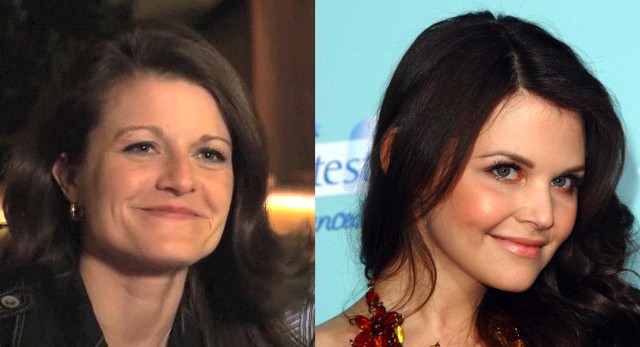
The timeline of the two shows’ interplay is frankly bizarre. The plot lines of “Big Love” focused on the human drama over the first four seasons, not beginning to take a political turn until its fifth (and final) season. Then “Sister Wives” came along. The first season of “Sister Wives” was as plain Jane as you can imagine, dodging any whiff of politics. But in between “Sister Wives”’ first and second seasons (November 2010-March 2011), all that changed, in real life and in fiction. “Big Love” aired each Sunday night in the interim, and Bill Henrickson took his pro-transparency polygamy agenda to state politics, with devastating repercussions that dominate the entire season. Meanwhile, “Sister Wives” also shifted toward the political. While the state of Utah’s policy has been not to prosecute bigamy except when investigating another associated crime, the Browns were just too bold. During the show’s hiatus, the state of Utah started investigating the Browns for felony bigamy, which was terrifying for the Browns but terrific for ratings. Everything has changed in fact and fiction, and the Browns are back this season with a political purpose.
We learn through the wives’ commentaries that polygamy is both common in their community and met with severe prejudice, both from the mainstream LDS community and the law. The Browns also want to air the dirty laundry of polygamy, to subject the practice to public transparency. When asked about potential legal repercussions of the family’s big reveal, third wife Christine is clear, “Raising children in a closed society could cause a lot more damage than any kind of legal trouble.”
Bigamy: Meet Gay Marriage
Kody Brown’s use of “lifestyle” may make him sound more relatable, the word is also rhetorically loaded. “Lifestyle” points to an element of choice, and that works in the Browns’ favor. They want to emphasize choice as a counter to the public image of polygamy: brainwashed child brides held against their will.
By contrast, for the LGBT community, the term “lifestyle” has been political poison. In the somehow still-ongoing debate about the role of choice in sexual orientation, “lifestyle” has become the preferred euphemism for critics of gay rights. Because when being gay is a choice, then why don’t you just not make that choice — and stop making people uncomfortable? With “lifestyle” comes a string of questions about agency and freedom.
The gay parallel doesn’t stop there. Kody often describes “Sister Wives” as part of his process of “coming out” as a polygamist. Now he will cope with the opinions of his coworkers and neighbors. Like Bill Henrickson on “Big Love,” Kody hopes for acceptance (or at least not to be prosecuted by authorities). His wives have shared the burden of years spent lying and self-censoring. Robyn sees the purpose of going on the show in political terms: “I don’t want my kids and my grandkids growing up oppressed.” Mainstream America already has a name for revealing something essential and taboo about yourself. Most Americans already understand that the “coming out” process is difficult but necessary, and that it’s important for all involved to be accepting and supportive. Gay people around the country have done hard work over the past 30 years to make the public comfortable with coming out. Now, Kody Brown would like America to extend that comfort to him.
Kody may use the term “coming out” every three minutes, but TLC never lets us hear how he, a devoutly religious man, feels about actual gay people. We barely see the Browns’ religion at all. Instead, we learn all about how Christine is the children’s favorite cook because she makes lots of unhealthy comfort food. Christine is the traditional one, the Chloe Sevigny look-alike. One episode follows her into a mammoth pantry that looks stocked for the apocalypse (or one week with a family of 21). She is cooking fish stick tacos, which she has craved “fortnightly” during her pregnancy, for the platoon of children in her kitchen. In confessional, she seems upset that the older children have expressed reservations about becoming polygamists in their adult lives. Both she and another wife, Meri, grew up in polygamist households, but went through a questioning period as teenagers. All the wives insist that each child will need to make this choice privately, that arranged marriages are not OK, and that marrying for love is essential. But a little more information about their religion slips in. Christine’s is not just disappointment that the children might not be attracted to her “lifestyle.” Leaving polygamy would mean leaving the faith. This is an impossibly harsh choice. In the kind of gender imbalanced polygamy that they practice, the numbers simply don’t add up. There aren’t enough girls to go around. I can only hope, for their own sake, that most of their boy children are gay. What are the odds that they hope that, too?
In an episode of CBS’s “48 Hours,” which aired in 2008, two years before “Sister Wives,” Christine shares her insights on polygamy in a panel of well-manicured suburban polygamist wives. Outside the lens and restrictions of TLC, she’s not so hesitant to talk about the religious underpinnings of her practice, “It’s just the way that Abraham, Isaac, and Jacob lived in the Bible.”
Perhaps the Browns do not oppose gay rights? Outside the show, Robyn almost addresses the issue directly in a rare press interview. “My best friend is gay; we are open to that,” she said. “I teach my children that we are open to that… We teach our children what we believe, but we give them the opportunity and the openness to choose for themselves.” It may be the editors’ choice and not the Browns’ choice to keep implicit the parallel between the struggle of LGBT Americans for civil rights and the right of the Browns to live their private lives without prosecution. Like all reality stars, the Browns have little control over how their story is crafted. In the interest of diversity, our culture’s greatest asset, I’m glad that the Browns have offered themselves as spokespeople for choosing a life outside the norm. I recognize the importance of not confusing an institution with some of its examples.
The tensions between fundamentalist religion and a need for tolerance sit awkwardly under the surface of the entire first season of “Sister Wives.” Neither the Browns (nor TLC) express any explicit support for marriage equality — or any kind of change at all. As willing as Kody Brown is to ride the wave of general support for “alternative” “lifestyles,” nobody is taking a stand on anything. Kody is surely not going to stand up on the issue of alternative families to the LDS Church, which, as most of us know, was the largest funder of the opposition to gay marriage in California and is largely credited with funding Proposition 8, the referendum to amend California’s state constitution to ban gay and plural marriage (the amendment has since been ruled unconstitutional). The LDS Church is the most rich, powerful and organized opponent to marriage rights in the nation. Kody Brown is also persecuted by the church’s policies, but he practices a fundamentally similar faith.
For a confluence of reasons, during the show’s second season, the Brown family moved out of Utah. The season opened explosively, with the Browns’ national “coming out” on “The Today Show.” In the show’s confessional, Kody mused, “Kids are being taught tolerance at school now. I remember growing up in school and being taught the value of civil rights and the value of tolerance. It’s not just taught now; it’s a morality.” Second wife Janelle chimed in, “I’m grateful for that.” Kody answered, “I am, too.”
The Politics Of Reality
Perhaps the popularity of “Sister Wives” also comes from the polygamous life sounding controversial but also pretty appealing. It’s the anti-lonely dialectic to “Desperate Housewives.” While TLC’s shows themselves are mostly content-free, the underlying message is clear. You’ll like people if you just get to know them. It’s a message of tolerance. It’s strange, then, that TLC will show everyone but gay people. What I read in between its lineups is that hardcore Christians who have 19 children merit tolerance, but gay people do not. Surely Americans are just as curious about gay families as they are about hoarders and extreme cake bakers? Perhaps gay people already have all the tolerance they need? Well, no. Even a campaign as universal as anti-bullying has been polarized by elected officials, like Michele Bachmann, who insist that being against bullying furthers the homosexual agenda of tolerance.
So what can we say about the power of reality television? Is the medium a message, does it have some influence in spite of its apolitical content? The impact of reality TV is a hot topic, newly analyzed in Jennifer Pozner’s book Reality Bites Back. Reality television can make people relatable. It can also make them into caricatures. It can make teen pregnancy seem normal, but also like an extreme bummer. Does that encourage or discourage teen pregnancy? Reality TV requires patience and intelligence to take its “realism” with a grain of salt (concentration that we don’t often have while watching so-called “guilty pleasure” TV). Reality TV can make things seem normal, even things like polygamy. That means that it can change what is normal, and it can change our sense of tolerance. It’s up to the viewing public whether we decide to extend that compassion into real life.
One of the best advantages of reality TV is the rare occasion when people slip in some unscripted honesty. Like the rare wardrobe malfunction on live TV, flashing a boob against all odds, sometimes a reality character says a bit more than she’s supposed to, opening a window into her true feelings. On “Sister Wives,” Christine has come the closest to addressing the parallel between her family situation and gay marriage. In one episode, giddy in her newly “out” state, she fills in the emergency contact form on her children’s school paperwork for the first time with true answers. She stops to contemplate what it’s meant for her to be open about her family situation. It’s clear that an enormous burden of secrecy has been lifted from her, although the path ahead is dangerous and the footing shaky. She can’t seem to make the right words come out of her mouth. She’s sure she’s done something very good by being brave and open. She feels solidarity with those living underground around the country, she just doesn’t want to use the word homosexual: “And all the other families, not just polygamous families, but there’s probably a lot of other families that feel like they have to be secretive, about, whatever. This is extremely liberating.”
Beyond saving money on scriptwriters, what is the boom of reality TV really about? Are we a society of over-sharers with no boundaries? I don’t believe it’s a question of exhibitionism. If everyone’s human drama is such old news, why is TV voyeurism so alive and well in the forms of “Big Love” and “Sister Wives”? Personally, I will reserve my positive judgment of the medium until TLC manages to show one gay character, hopefully one who is married. You think ratings are decent when you show polygamists? Try a show watched by every gay family in America, and every gay person’s parents as well. The fight for equal rights under the law is happening right now — in high human drama, full of love, violence and heroism. Sometimes it’s even on TV.
Melissa Tapper Goldman does all kinds of things, mostly in New York City, but also elsewhere. The documentary that she made is called Subjectified: Nine Young Women Talk about Sex
.
Since You Asked: What Is A "Rebecca Black"?
On Fridays, we take requests. A reader writes: “It’s sad that I rely on your blog so much in order to have relevant things to say in conversations about recent viral videos. And I understand — one day is pretty quick to come up with something to say about this amazing tome of teen angst that picked up seven million views yesterday. But come on.”
Well, that email was from 30 hours ago, and now it has 16 million views on YouTube. So here is what we know. 13-year-old amateur Rebecca Black’s song “Friday,” which was a song purchased and recorded for two grand from a vanity label, is about how the week sucks. It’s a celebration of the end of school and work, and indoctrination to a future nation of low-paid worker-slaves. That’s reasonable! Its intended audience will “get down on Fridays,” as she sings, until we repeal the eight-hour work-day and the five-day work-week. Oh wait, Walmart already did! So she’s right on time.
More things to know:
• The lyrics are just as insipid as any of the recent work by Lady Gaga and Katy Perry. (I would add Madonna to that list!)
• It’s giving us a good look at Internet scorn. Which she’s taking in great stride, suggesting that perhaps it’s not acceptable for strangers to be telling her to go kill herself.
• It’s also a terrible moment for aspiring young people, who will get their parents to sink money into vanity projects that won’t get 16 million hits on YouTube.
• She’s also quickly becoming a brand. And guess what? She’s going to be sticking around. It’s an axiom of the attention economy that negative attention is also fame-creating!
• That damn song is horribly catchy. Listen if you dare.
Do you have a question for Fridays? You can always hit us up at notes at theawl dot com.
Ignore The Moon This Weekend, It Is Just Desperate For Attention

Okay, listen up, moon, I don’t like you and you don’t like me. So when I hear that you’re going to be at your fullest and closest this weekend I know what it’s all about: revenge. You’re obviously still pissed off about that thing where we tried to blow you up. You’re going to sit there, looking close enough to touch, but actually “some 211,600 miles (356,577 km) away.” You want me to think I can finally take a swing at you and look ridiculous as I flail about because you’re actually hiding safely away in space like the gigantic pussy you are. Forget it, I’m not falling for it. As much as you deserve it — and man, how I would like to punch your stupid reflective lights out — I am not taking part in any of your sick, pathetic mind games. NOBODY CARES HOW CLOSE YOU LOOK. Perigee this, you useless chunk of discarded Earth garbage.
Photo by Luc Viatour.
